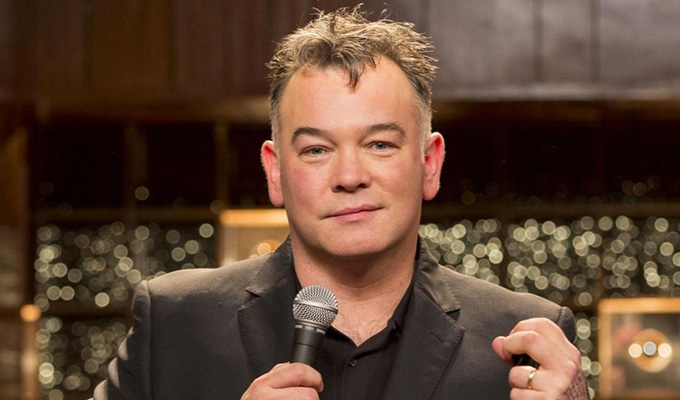
Stewart Lee: Room With A Stew
Note: This review is from 2015
Gig review by Steve Bennett at the Leicester Square Theatre
'No one's equipped to review me,' Stewart Lee asserts with his usual mix of certainty and superiority – guaranteeing this very same line will kick-start a dozen critiques… including this one.
Because it's true: there can't be a line, a pause, a change of tone that Lee hasn't considered in so much more depth than any observer possibly can. It's also hard to review him because from the stalls it's impossible to say what proportion of his difficult relationship with his audience, somewhere between contempt and disappointment, is genuine, heightened or fabricated.
He's written before about how he needs to manipulate the dynamic to put himself on the back foot and Lee even makes his relative success a handicap, bemoaning the philistines dragged along by friends only because they've heard he's culturally relevant, not because they are intrinsically fans of the pure, alternative ethos of what he's trying to do.
But is it true that we're a sluggish crowd who aren't getting the usual bankers? He seems sincere on that – and indeed he never delivered the encore that he was so keen on at the start of the gig.
This long run at the Leicester Square Theatre is, like the Edinburgh show that preceded it, a work in progress for the next series of his Comedy Vehicle on BBC Two. He runs through three 28-minute routines (denying us a fourth that would have been the encore), which already seem pretty polished. It's a process that he makes clear is for his benefit, not ours, as he occasionally scribbles our responses and timings on a tiny scrap of paper, like a golfer's scorecard, to chart the progress.
Such arrogance doesn't always go down well – certainly not with Daily Telegraph writer Dominic Cavendish, who famously slated Lee for insulting his audience in an article that certainly boosted his clicks, if not his credibility. There's some comeback to that piece in this show as Lee patiently, perhaps patronisingly, explains that he's employing Brechtian alienation; asking people to laugh DESPITE his personality, not because of it. This remains an almost unique approach in a TV comedy scene dominated by panel-show personalities, with many of the live circuit's young antisocial pretenders to Lee's crown able to copy his style, but not his insight.
There's a strong undercurrent of politics in Room With A Stew – but the greatest injustice he dwells on is losing out to Graham Norton for a best comedy Bafta, in a monologue that dances between irony and irritation at the lesser craft of chat-show being hailed above his hard-won stand-up artistry. And all this despite Lee claiming to have been a Norton fan ever since they shared a tiny Edinburgh Fringe venue back in the day.
It again plays to that fuzziness as to whether his disdain for the wider world is real, a stance that culminates in him equating our muted reaction to a forced routine about his family's unlikely catchphrase to the pressures that drove great comedians to take their own lives, made despondent by the demands of entertaining fickle crowds. Speaking of suicides isn't the most obvious thing to bring the mood up, but it gives this impassioned rant a strong emotional pull, towing us all into a brilliant high-stakes routine, which feeds expertly off the unpredictability of live performance.
In many ways Lee is the Pompidou Centre of stand-up, leaving all the functional gubbins exposed for all to see, yet he still manages to surprise. And although he's long mastered the mechanics of comedy, it provides endless fascination for him, as demonstrated by his diatribe about lazy nostalgia-based stand-up, or his tongue-in-cheek argument why only observational comedians can be trusted to relay wryly funny incidents in the real word, not untrained civilians.
There's also talk of how he's selling out now, doing 'kids say the funniest things' shtick just because he's got a hefty mortgage to pay. Should you be so minded, you could probably see political analogies here with selfishness justified in the name of deficit reduction… although his take on the state of political comment (in particular with reference to Lee's favourite subject, context) comes with a silly and gross routine about the exploits of his cat, the unfortunately named Jeremy Corbyn.
For all his cleverness Lee can get a good six or seven minutes here out of the most base, low comedy – which he does by returning to the principles of repetition and over-extension that once defined him.
Even in this putative stage, these are routines that are unafraid to fail, sometimes on purpose, in the cause of taking the audiences to places they could never expect. And that's what great art – including great comedic art – should surely be striving for.
Review date: 29 Sep 2015
Reviewed by: Steve Bennett
Reviewed at:
Leicester Square Theatre






